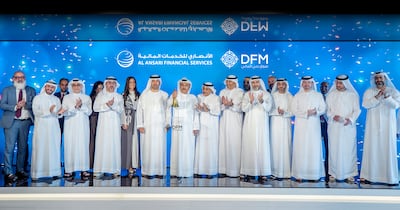GCC stock markets will continue on a strong growth trajectory this year, led by the UAE and Saudi Arabia, on the back of strong macroeconomic fundamentals, a vibrant investment landscape, cooling inflation globally and higher expectations of rate cuts, analysts say.
Economic growth, especially in the non-oil sector, will strengthen in 2024, driven by strong government spending, which in turn will support markets.
“Saudi Arabia and the UAE appear particularly promising from an economy and markets perspective," said Faisal Hasan, chief investment officer and head of asset management at Al Mal Capital.
"The region will continue to see a strong pipeline of [initial public offerings], which will increase the breadth of the markets."
Stock markets in the GCC ended the year on a largely bullish note, in line with a strong rebound in regional economies.
The GCC equity market index closed 2023 at 714.69 points, registering a gain of 3.7 per cent, after recording mixed performances at the country level, Kamco Invest said in a note.
Saudi Arabia's Tadawul stock exchange, the Arab world's biggest, closed 2023 up 14.2 per cent, while the Dubai Financial Market was the best performing index, ending the year 21.7 per cent higher.
The Abu Dhabi Securities Exchange, the region's second-largest stock market by value, fell 6.2 per cent for the year.
The Qatar Stock Exchange ended 2023 up 1.4 per cent, Bahrain was up 4 per cent, Oman’s index closed 7.1 per cent lower, while Kuwait's bourse was down 6.5 per cent for the year.
Markets in the wider Mena region also posted a mixed performance. Egypt’s EGX 30 index was the best performer in the entire region, gaining more than 70 per cent last year.
This was followed by Morocco with gains of 13 per cent, Lebanon up 10 per cent, Tunisia posting an increase of about 8 per cent, while Jordan's index ended the year around 3 per cent lower.
"The UAE and Saudi Arabia lead the region and have undertaken ambitious diversification efforts to reduce oil dependence and stimulate growth in non-oil sectors," Vijay Valecha, chief investment officer at Century Financial, wrote in a recent opinion piece in The National.
"These strategic initiatives have significantly affected stock market performance, making them more attractive to investors.
"This was evident in the robust increase in IPO activity, with the GCC region standing out globally."
GCC stock markets recorded a flurry of listing activity last year, with some companies notching significant gains on their trading debut driven by overwhelming investor demand.
There were a total of 29 IPOs with total proceeds of $5.8 billion in the first nine months of the year in the Mena region, with all the listing activity taking place in the GCC, according to the latest report from consultancy EY.
The main drivers for the GCC region’s IPO growth include government incentives, foreign investor interest and diversification efforts, analysts say.

The performance in the GCC "highlighted the importance of a strong pipeline of IPOs that are critical for attracting international capital flows and generating resilient market performance", Kamco Invest said.
"Both Saudi Arabia and Dubai exchanges saw IPOs of some of the key companies in the region garnering strong investor demand. The markets, especially Saudi Arabia, were also insulated from the decline in crude oil prices that is still essential for economic growth in the region," it added.
Going forward, markets are likely to record improvements in corporate profits and increased liquidity.
"I see strong investment opportunities in the stocks of banking, retail, technology, telecommunications and tourism sectors in the Gulf stock markets, especially with the surge in IPOs in the Saudi stock market during 2023," Rania Gule, market analyst at xs.com, said.
"The development of the non-oil private sector and improvements in economic indicators, such as an increase in consumer spending and a decrease in unemployment rates, indicate the strength of economic conditions in the GCC countries."
The IMF and World Bank estimate an average Mena growth rate of 3.5 per cent next year, up from 2 per cent in 2023.
This is higher than the global economics growth projections for next year.
The IMF expects global gross domestic product to expand by 2.9 per cent, while the World Bank estimates 2.4 per cent growth and the Organisation of Economic Co-operation and Development forecasts it at 2.7 per cent.
“Non-oil economies across the [GCC] region are set to have another decent performance in 2024, largely thanks to government spending,” Edward Bell, head of market economics, at Emirates NBD, said in a research note.
The UAE’s economy is expected to expand by 3 per cent this year and 4 per cent next year, driven by strong growth in its non-oil sector, S&P said in a September report.
Analysts also expect large-scale and ambitious reform programmes implemented by policymakers to continue to yield benefits in the region and attract investors.
“Non-oil revenues are gradually increasing in the GCC, providing a positive outlook for their economies. Encouraging indicators include continuous GDP growth, improved performance in the non-oil sector, a growing workforce, stable inflation levels and a declining unemployment rate,” said Mr Hasan of Al Mal Capital.
However, analysts cautioned any weakness in developed markets is likely to be felt across the Mena region despite favourable growth dynamics.
Among other main concerns this year is geopolitics outweighing economic risks in the wake of a flare-up in the Israel-Gaza war or a deterioration in the US-China relationship.
“We think the bigger dangers in 2024 will be geopolitical, which have more potential to throw expectations off track,” William Davies, global chief investment officer at asset manager Columbia Threadneedle Investments, said last month.


